Eugen Krammig: A German with an Abkhazian Destiny
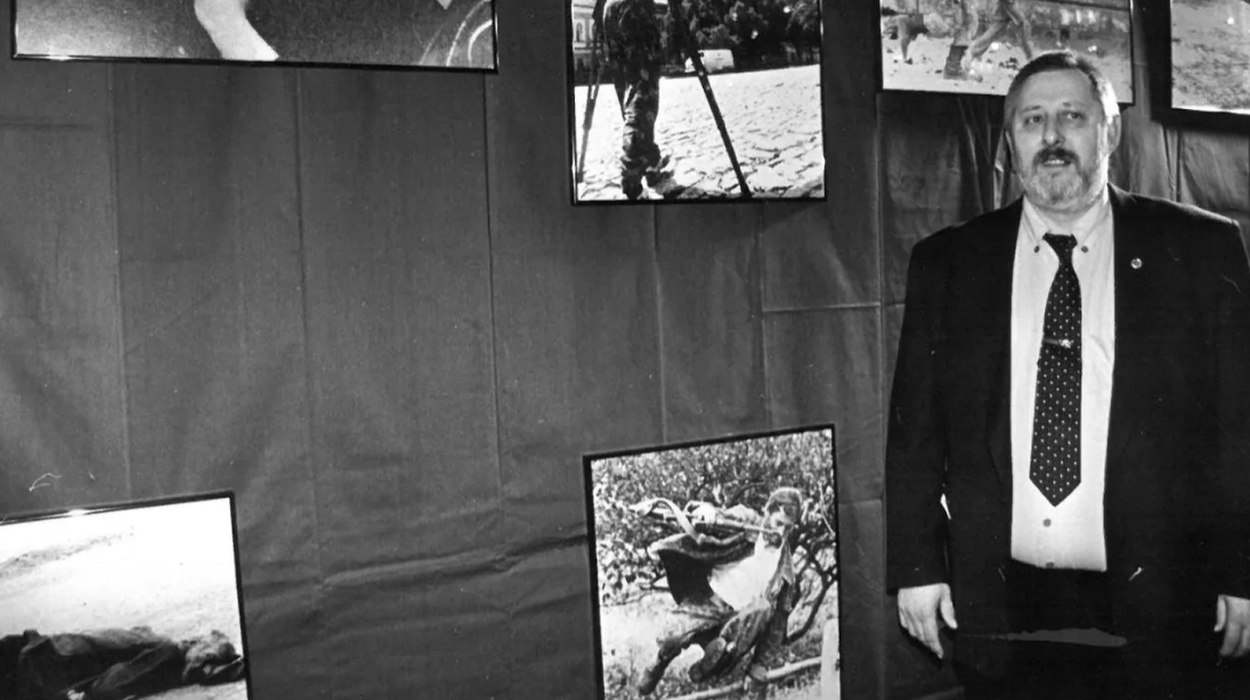
Eugen W. Krammig (1950 - 2010) was a German Journalist, philanthropist and Honorary Consul of Abkhazia in Germany.
"Eugen Krammig was born in 1950 in Hanau, a town located near Frankfurt. Throughout his life, he experienced many interesting and eventful moments. Krammig was a truly talented and versatile individual - he worked as a journalist and was also a sportsman. He had the opportunity to accompany famous people such as Jimmy Hendrix and Pink Floyd. In addition to his professional pursuits, Krammig was also known for his compassion and willingness to help others. He aided those affected by the earthquake in Turkey and children from Chernobyl, Chechnya, and other countries."
Once he visited Abkhazia Krammig fell in love with this country and its people for life.
Despite many difficulties and threats he always helped Abkhazia as much as he could. Eugen Krammig brought to Abkhazia a batch of humanitarian products such as medical supplies, hospital equipment, building materials, etc.
About the destiny and life of the Honorary Consul of Abkhazia in Germany, about the humanitarian cargo brought to the blockaded Abkhazia, about how the world learned about the Country of the Soul through Western publications, books, fairs, created by German journalist Eugen Krammig, read in this blog post.
Happened upon Abkhazia by accident
In 1995, Eugen Krammig came to Moscow on a journalism exchange. He accidentally dropped by the editorial office of the "Man and Law" magazine to talk to his colleagues, take a break and have a smoke. There he met Sergei Arutyunov, a journalist from Abkhazia, who was a reviewer for the publication. Eugen Krammig told him about his trip to Tbilisi, his meeting with Eduard Shevardnadze, and how the President of Georgia gave him a very expensive dagger. But most of all, he was struck by the Georgian leader's story about the Abkhazians, "wild and cruel Muslims who mercilessly kill Georgians."
Sergei Arutyunov tried to persuade him. But Krammig was stubborn, the argument went on, and the journalist offered his guest to simply go to Abkhazia with him to see everything with his own eyes.
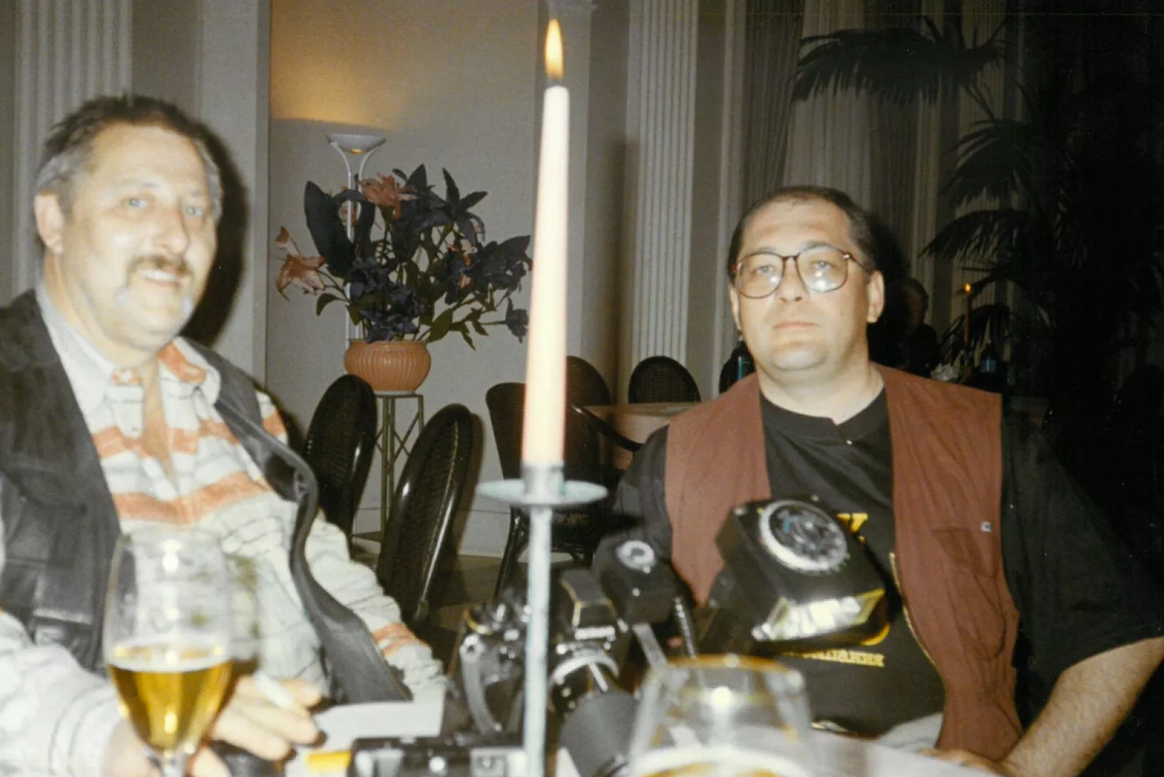
Eugen Krammig (left) and Sergei Arutyunov.
"After an endless series of 'tea cups' and a block of smoked cigarettes, we miraculously woke up in Abkhazia the next morning. I had to be home, and he was there for company…" Arutyunov remembers.
A closed country
In 1995, Abkhazia was isolated following a heavy victory in its war with Georgia. The struggle for survival continued.
"When Abkhazia was artificially isolated from the rest of the world, when our fellow citizens were paid a salary in the form of a couple of loaves of bread, when it was considered happiness to obtain a couple of extra kilograms of sugar, when people were dying from the lack of necessary and sometimes even the simplest medications. Through the Psou border checkpoint, access to Russia was only granted to women and men under 16 and over 65. Telephone communication with the outside world was cut off, and the press in the world wrote almost nothing about the true situation in Abkhazia, simply because they knew nothing. That is, in addition to the economic blockade, the country found itself in an informational blockade as well," described the situation in Abkhazia by Sergei Arutyunov in the newspaper "Novy Den" (New Day).
+ The Blockade of Abkhazia
Under Boris Yeltsin, in 1994, (immediately after the end of the Georgian-Abkhazian war), Abkhazia was subjected to a severe economic and political blockade. According to these sanctions, no Abkhazian man aged from 16 to 65 could legally cross the Russian-Abkhazian border along the River Psou. The list of what could be taken in and out of the blockaded republic could be written on a scrap of paper. Even ordinary antibiotics, without which no medical institution could function, were prohibited.
It was with such a country that Eugen Krammig was destined to become familiar with it and to connect his life with it for many years to come.
First Impression
Upon arriving in Abkhazia, Sergei Arutyunov called his close friend, actor of the theatre and Minister of Culture, Kesou Khagba.
"Sergei called me every day, but I couldn't get out. He said he had brought a foreign journalist who had been given a terrible opinion about Abkhazia. 'We must open his eyes to the truth!' he said. And four days later our meeting took place," recalls the former minister.
The meeting took place in the office. The minister's friendly and amiable appearance did not soften the heavy mood of the German journalist, and the reason was revealed almost immediately.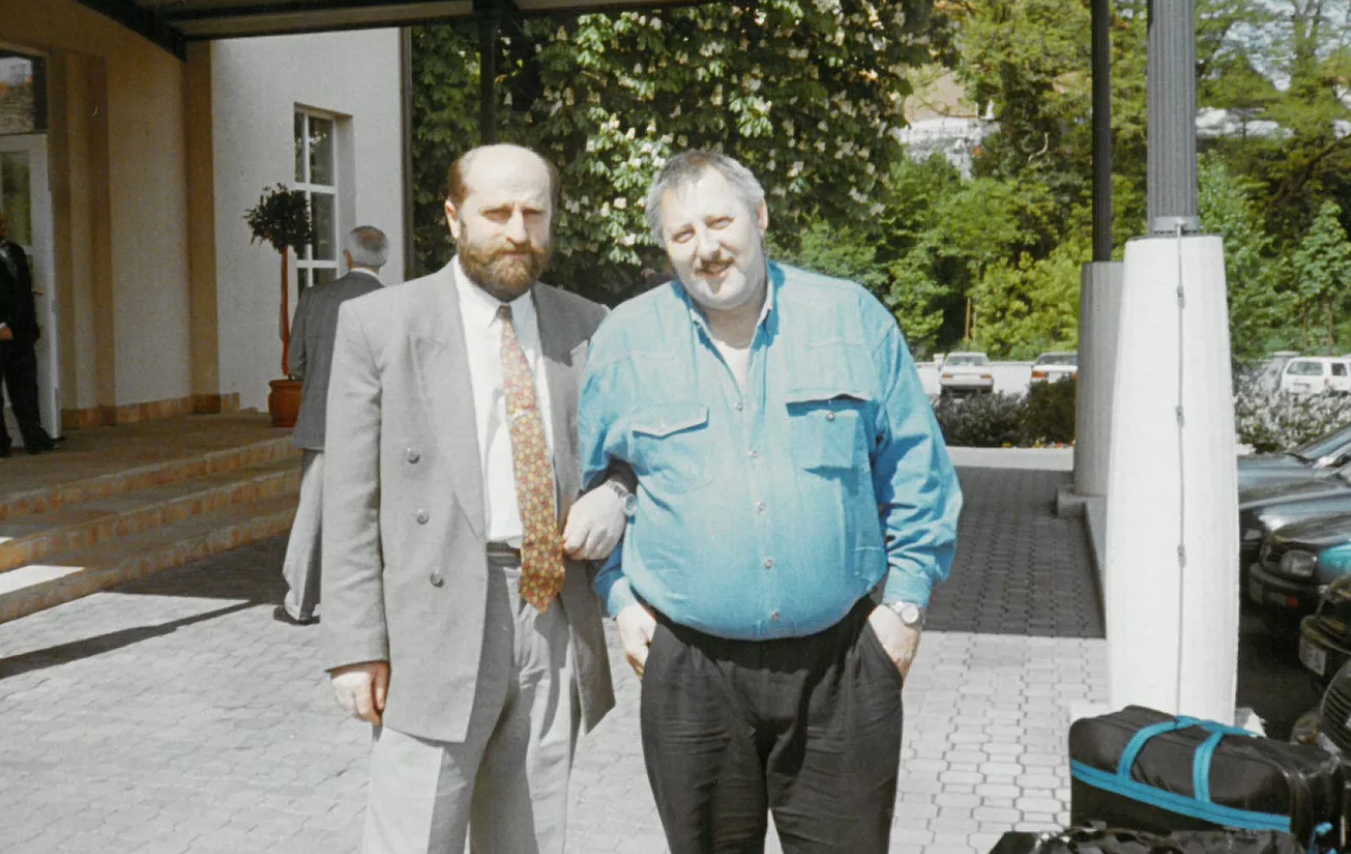
Kesou Khagba and Eugen Krammig before a press conference in Germany.
"Eugen told me that over the past few days he had read everything he could find about the history of Abkhazia, and it helped him to see at least a little bit. 'I understood a lot, I understood the whole truth, but one thing I can't comprehend: Sukhum is your city, your capital, you have shed so much blood and given so many lives for it, you have spent so much strength for freedom and independence. I understand that it is very difficult to restore the city after the war, but why don't you clean up the garbage? Why do you throw dirt out of the windows, it is unacceptable. You are Abkhazians, this is your land, your home!' His words were not a reproach, but there was a lot of compassion and excitement," Kesou Khagba relates.
The conversation was serious. At the end of it, the guest asked to see the city hospitals, continues Khagba.
"We showed him one hospital, then another, the impression was terrible. After the war, all hospitals were poorly run, there was dirt everywhere, patients were lying on torn, reeking mattresses, and it was hard to watch. Krammig went from ward to ward, he did not hide his emotions, his eyes were filled with tears from the horror of what he had seen," recalls the artist.
Eugen asked his new acquaintances for a meeting with the head doctor, but he was not there, and they headed for the exit.
"As we were leaving the hospital, we noticed a beautiful new car pulling up, and the head doctor got out. I pointed to him, explaining to Krammig that this was the head doctor of the hospital, which greatly surprised our guest. He asked several times if it was really him, and how it was possible. Where did he get such a car if his patients are rotting in the dirt? We didn't know what to say. And what answer could be given here?" Khagba tells.
The disappointed German journalist took out some money and asked to buy a ticket home. But it was not at all desirable to let the guest leave with such an impression. The minister convinced Krammig to go to the New Athos cave. The small and clean New Athos rarely leaves anyone indifferent, he thought. After much persuasion, the journalist gave in, and they set off.
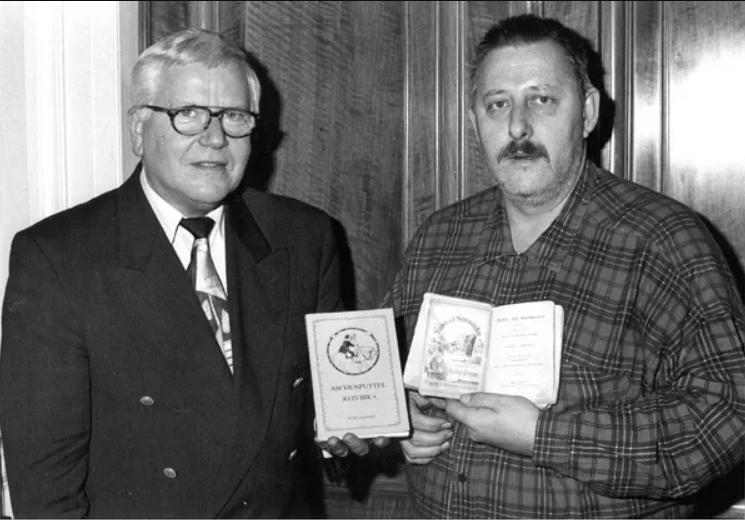
Klaus Remer and Eugen Krammig (with copies of Grimm fairy tales brought from Abkhazia in their hands).
"We visited a cave, walked around the city, visited a monastery, and our guest was changing right before our eyes. But this trip wasn't over yet, so I suggested visiting my mother in my hometown of Duripsh," continues Kesou Khagba.
As we approached the village, Kesou asked to drive a little further to show a beautiful forest located not far from home.
"We were admiring the landscape when my neighbour Shaveil Taniya approached us. After greeting us, he asked:
— What are you standing here for?
— Well, I'm showing our guest from Germany our beauty, I replied.
— Yes, there's plenty to see here, but it's already evening, come to my house, I invite you all, he generously offered.
Eugen was surprised and quietly asked:
— Is that allowed?
— Of course, it will be a pleasure for him, I replied, and we all followed Shaveil."
According to Kesou Khagba, Krammig was greatly surprised by the large and clean yard of the Abkhazians. Going into the house, he asked to look around, went into the kitchen, into the dining room, into the guest room, where everything shone with cleanliness. But the book "Tales of the Brothers Grimm", natives of his hometown of Hanau, made the deepest impression on him, the artist shared his observations.
+ Eugen Krammig: Life after death, by Vitaly Sharia
+ In Memoriam Maurizia Jenkins
+ Abkhazian business with a French accent
+ Swiss journalist and philanthropist Manfred Petrich dies in Abkhazia
"Shavel is one of the most learned peasants I know. He is well acquainted with the history of Abkhazia and also knows world history well. Eugen looked at his big rough hands and listened to his deep, interesting stories. There was no limit to his surprise," recalls Khagba with a smile.
On this day, Eugen Krammig experienced true Abkhazian hospitality. As soon as they left one courtyard, they were immediately invited to another. Having visited several houses of hospitable neighbours, the whole company went to the minister's mother's house.
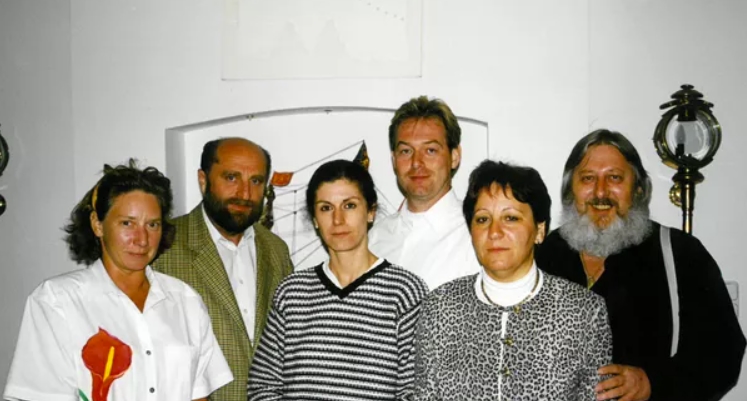
Members of the initiative group of the Fund for Abkhazia (from left to right): Brigit Messing, Kesou Khagba, Anet Glanzner, Axel Hasler, Valentina Graupner-Khvatlandziya and Eugen Krammig.
Three o'clock at night. A large shepherd dog greeted the guests with sonorous barking. Recognising the owner, she let the guests into the house.
"I woke up my mother, it was dark, she lit a candle and at Eugen's request began to brew a large mug of coffee. We told her that we have a foreign journalist as a guest, who helps people all over the world. She looked at him attentively and asked him a question that strongly affected our guest. The question was: "We live on our own land, the graves of our ancestors are here, we were attacked, we defended ourselves, this freedom came at the cost of the lives of our children, and they declare a blockade against us, where is the truth? Where is justice? What will you write about? What can you do? When even God is not on our side".
The conversation with Kesou's mother moved Eugen, he felt as if he had experienced all the pain with which she spoke. After a short pause, he asked for help to meet with Vladimir Ardzinba and discuss his plans with him.
Meeting with Vladimir Ardzinba
A meeting with the head of state was organised. A long and difficult conversation took place.
"Vladislav Ardzinba immediately felt in Eugen a man of substantial intellect, they quickly found a common language. He quickly explained to the guest the essence of the country's political problems, explained the full depth of the economic disaster, and told him about his vision for the future," continues the story as told by Sergei Arutyunov.
At the end, when the guest had relaxed a bit, Vladislav, in his usual style, began to joke, speak with irony, and tell funny episodes. Eugen tried to respond in the same manner, Arutyunov says.
"When Krammig started a conversation about his desire to organise humanitarian aid, the president remarked that many had promised such a thing, but forgot about it as soon as they closed the door to his office. Krammig flared up, offended, and firmly stated that the first humanitarian convoy would be here in the spring. That is how it happened subsequently," the journalist recalls.
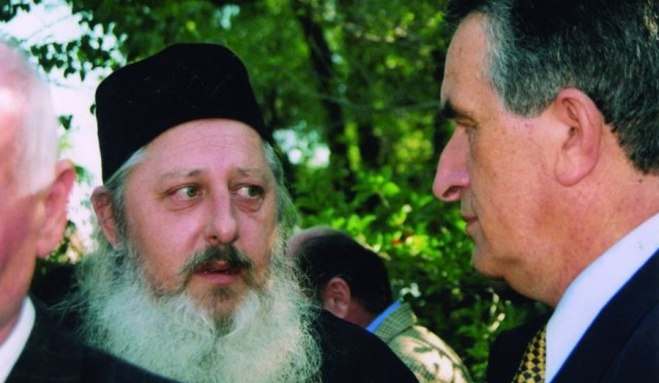
Eugen Krammig and Vladislav Ardzinba.
Ardzinba believed in the sincerity of the visitor, his desire to help and support the young state according to the level of his possibilities. Krammig, in turn, was conquered by the charisma of the country's leader, the level of his knowledge and brilliant wit. And throughout the subsequent period, on each of Eugen's visits, Vladislav was happy to see him - they met, talked for a long time, sat at the table, added Arutyunov.
"A person of great soul and heart"
"In the same year, in the city of Hanau, near Frankfurt, a large charity concert "Rock-n-Roll for Abkhazia" was held. The concert was broadcasted in all cities of Germany. Then a large photo exhibition about Abkhazia took place, which travelled through many German lands and neighbouring countries. The word "Abkhazia" sounded differently there. The perspective imposed on the Germans by another chancellor's friend, Helmut Kohl - the "grey fox" Shevardnadze - began to sway. The first private humanitarian convoy to Abkhazia was collected from the concert proceeds and voluntary assistance - children's clothing and food, medications, medical equipment and accessories - there is too much to list," writes Sergei Arutyunov.
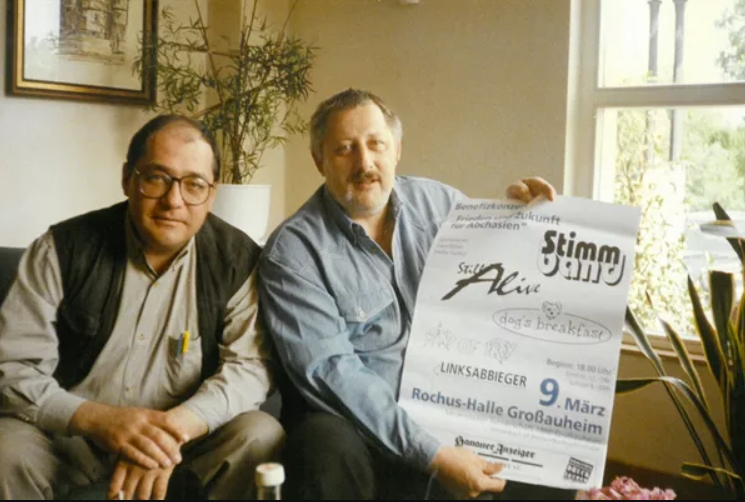
Before the big concert in honour of Abkhazia (Sergei Arutyunov, Eugen Krammig).
Delivering humanitarian cargo to blockaded Abkhazia was not an easy task. Kesou Khagba and Sergei Arutyunov accompanied this invaluable gift for the country. The journey passed from Germany to Poland, then through Belarus, but the most difficult part was transporting the cargo through Russia in the 1990s, where it was completely unsafe and there was rampant robbery.
"Customs and border bureaucracy at the Psou post was no less exhausting. A couple of times during this time, because of border bureaucracy, Eugen Krammig and I had to cross the Psou border on foot through the river, waist-deep in water, and in winter once sit in the Sochi gaol as deportees. We sat behind bars, but with a certain comfort. We found, so to speak, a "common language" with the local supervisors," Arutyunov recalls. According to Krammig's friends, all difficulties were forgotten when the cargo was handed over to the government of Abkhazia.
Despite being disappointed with the chief doctor's behaviour with his brand new car, Krammig gifted the hospital with about a hundred hospital beds. He brought many medications and equipment for blood purification, everything was handed over to the Ministry of Health, sometimes he himself distributed the drugs, went to hospitals and gave them to the sick personally. He was the first to help with the repair of the maternity home in Tquarchal.
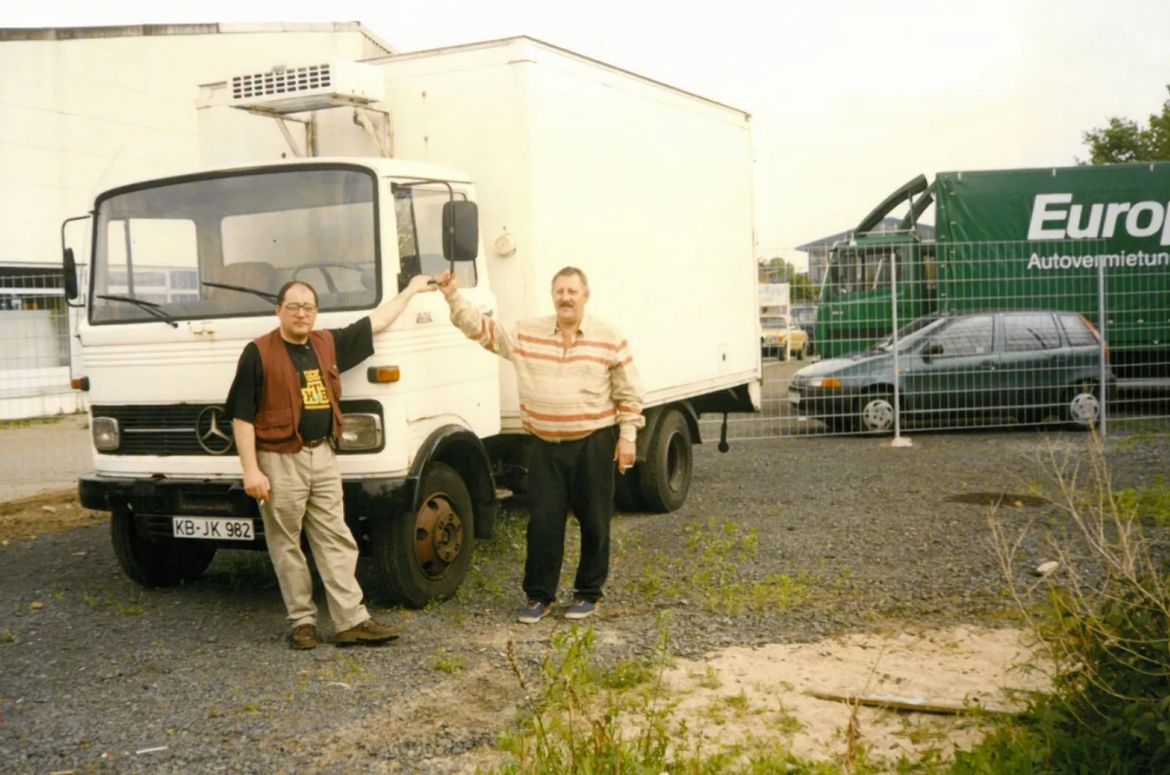
The first cargo is ready for shipment to Abkhazia (Sergei. Arutyunov and Eugen Krammig.
Over the years, Eugen Krammig has published over five hundred articles and conducted dozens of TV shows about Abkhazia in the Western press.
Krammig has published many articles about Abkhazia. I asked in surprise: "Why are you doing this? You constantly give news about Abkhazia, constantly write about some events happening here." - He replied that the importance of information cannot be underestimated. The word "Abkhazia" must sound constantly and be heard, so that people are interested and know of its existence, says the artist. From Abkhazia with love, from Krammig with admiration, from all of us with gratitude. Thank you for everything.
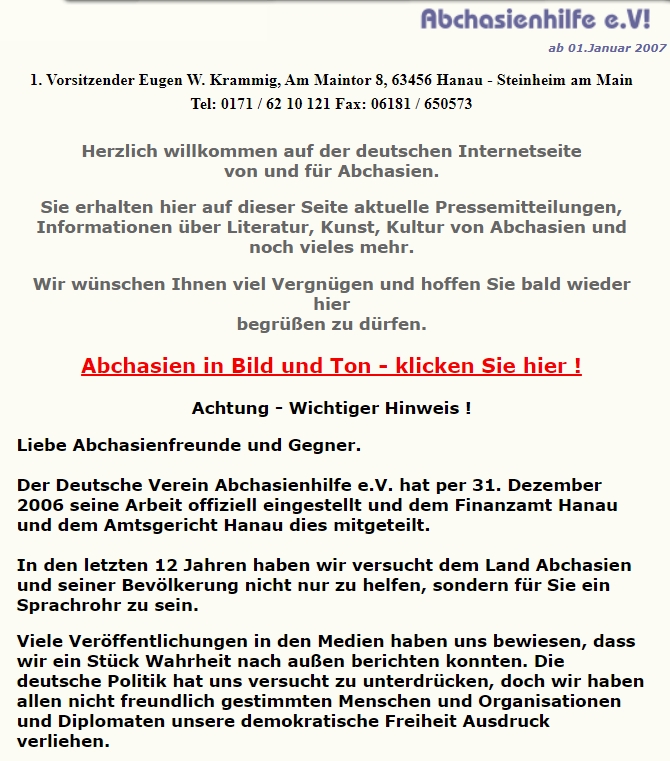
The website www.abchasienhilfe.com was created by Eugen Krammig.
From Abkhazia with love
Rodik Smir was a very intelligent and business-like guy. A war participant, he understood the importance of the issue very well and helped us with great enthusiasm. Once again, we were transporting humanitarian cargo with hospital beds and medications. It was a day off. At the border, we were greeted by a hungover border guard. He tried to create a conflict, provoking us with rude statements, says Kesou Khagba.
A border guard hinted at a bribe and, upon receiving a refusal, swore obscenely and insulted everyone. Rodik Smyr couldn't hold back and flared up, hitting the border guard. A commotion arose and the police were called.
"They wanted to arrest Rodik, but he firmly declared that if they put him in jail, the whole world would learn about the behaviour of the employee and the bribe he was demanding in colours. Rodik was left alone, but the cargo was detained," the former minister explained.
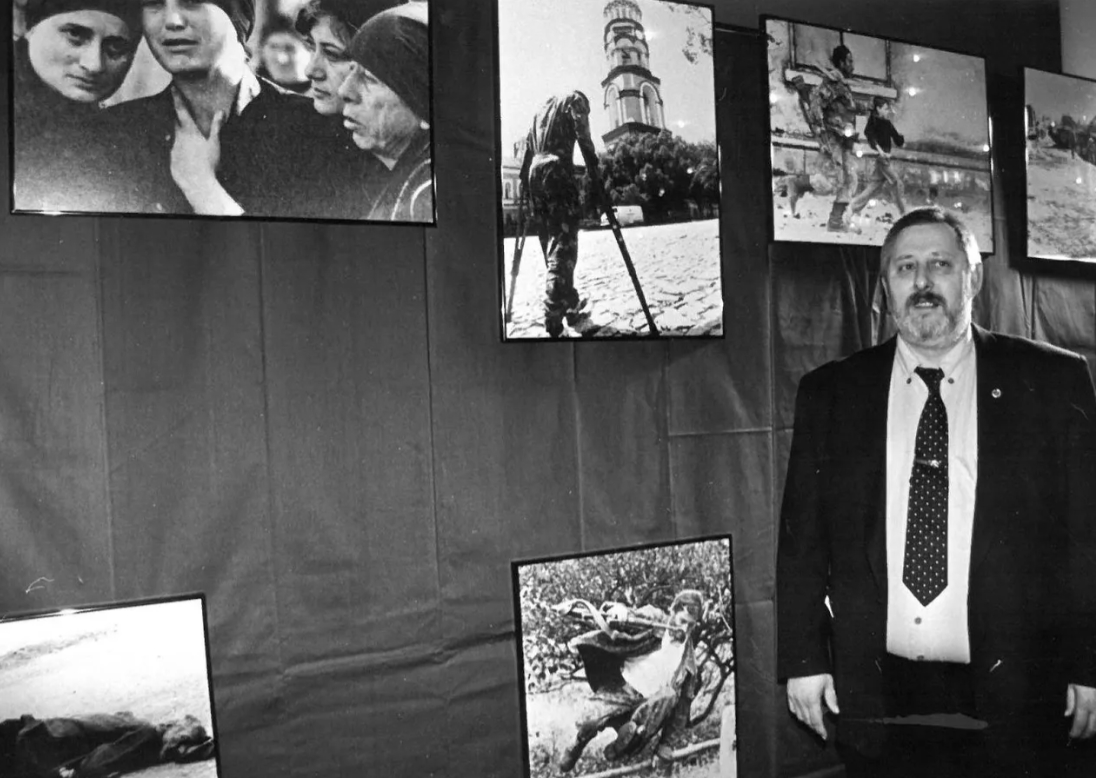
At a photo exhibition dedicated to Abkhazia.
When the container was opened, parts for medical equipment were found in the place where beds were supposed to be according to the documents. The entire cargo was declared contraband. The commotion reached the level of the State Duma. A criminal case was opened. And the humanitarian line was stopped.
"At the start in Germany, there was still one humanitarian convoy intended for Abkhazia. These were minibuses, food products, and medicine. Eugen was involved in charity work all over the world. Then he plastered the entire cargo with Abkhazian flags and presented it to Serbia on behalf of Abkhazia. He didn't miss an opportunity to raise the image of our motherland in European countries," continued Khagba.
To love a country in which one was not born
"Eugen Krammig managed to open three websites about Abkhazia during this time, which are used by thousands of people all over the world. On his own initiative, Krammig produced a Music CD entitled “Freedom for Abkhazia”, all the profits from the sale of which will be sent to Abkhazia. The famous German musician and producer, Win Kowa, the famous choir Nartaa, made up of (near) centenarians, and the Chicago Philharmonic Orchestra were among the contributors to this album.
This is the video prepared for one of the songs from the album "Freedom for Abkhazia (Stop the blockade)."
He sent it free of charge to anyone in the world who was at least somewhat interested in Abkhazia. He created a music video about the country, which was broadcast everywhere from Europe to Saudi Arabia. He did all this on his own funds. He strengthened ties with the Abkhazian diaspora in Germany and even played a unifying role at one stage," wrote Sergei Arutyunov in the newspaper "Novy Den" (New Day).
Eugen Krammig became the Honorary Consul of Abkhazia in Germany. At the instruction of Vladislav Ardzinba, he was given an Abkhazian passport and a territory in the Mayak area was allocated for the construction of a cultural centre. German journalists, public figures, and businesspeople began to arrive there regularly. The Abkhaz-German humanitarian fund "Abchazienhilfe" was registered.
In 2010, Eugen Krammig passed away. His body could not withstand the excessive workload. He was not even sixty. "Vladislav Ardzinba had many foreign friends, but there were none like Krammig, who genuinely suffered for the fate of Abkhazia. He believed that we have the full right to be a free state, with all its shortcomings, with all its negatives and positives, and if the world recognizes us, we can become a small Switzerland. He sincerely believed in this and did everything he could," recalls his friend Keso Khagba with sorrow. President of Abkhazia, Sergei Bagapsh, in 2007 by his Decree honoured Eugen Krammig for his tireless support and assistance to Abkhazia with the highest award of the republic - the Order of "Akhdz-Apsha" III degree.
We remember Eugen Krammig with love and gratitude.